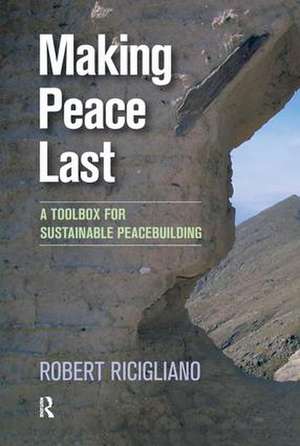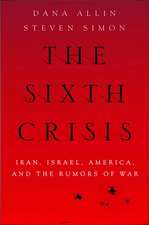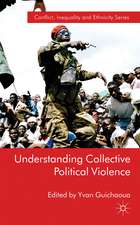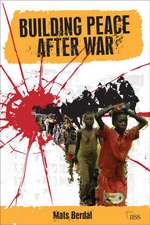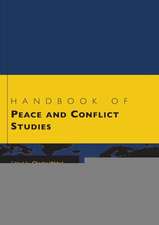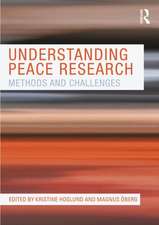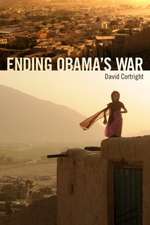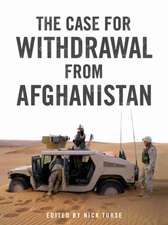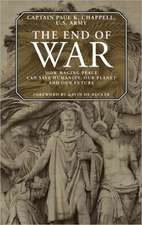Making Peace Last: A Toolbox for Sustainable Peacebuilding
Autor Robert Riciglianoen Limba Engleză Hardback – 30 noi 2011
| Toate formatele și edițiile | Preț | Express |
|---|---|---|
| Paperback (1) | 416.44 lei 6-8 săpt. | |
| Taylor & Francis – 30 apr 2012 | 416.44 lei 6-8 săpt. | |
| Hardback (1) | 876.78 lei 6-8 săpt. | |
| Taylor & Francis – 30 noi 2011 | 876.78 lei 6-8 săpt. |
Preț: 876.78 lei
Preț vechi: 1178.85 lei
-26% Nou
Puncte Express: 1315
Preț estimativ în valută:
167.77€ • 175.64$ • 138.82£
167.77€ • 175.64$ • 138.82£
Carte tipărită la comandă
Livrare economică 05-19 aprilie
Preluare comenzi: 021 569.72.76
Specificații
ISBN-13: 9781594519949
ISBN-10: 1594519943
Pagini: 288
Ilustrații: Illustrations
Dimensiuni: 152 x 229 x 23 mm
Greutate: 0.52 kg
Ediția:1
Editura: Taylor & Francis
Colecția Routledge
Locul publicării:Oxford, United Kingdom
ISBN-10: 1594519943
Pagini: 288
Ilustrații: Illustrations
Dimensiuni: 152 x 229 x 23 mm
Greutate: 0.52 kg
Ediția:1
Editura: Taylor & Francis
Colecția Routledge
Locul publicării:Oxford, United Kingdom
Recenzii
“No bigger challenge faces humanity than how to build peace. In this insightful, provocative, and practical book, Robert Ricigliano shows us how to take a systems approach. A very useful contribution!”
—William Ury, Harvard Negotiation Project, and author of The Third Side: Why We Fight and How We Can Stop
“The advance of peace in the post-cold-war era stopped around 2003 and global peace efforts must be reinvigorated. In his book Rob Ricigliano uses his research and experience to describe not only why so many well intended peace programs fail, but, more importantly, what can be done to systematically untangle the remaining wars and humanitarian outrages on our watch.”
—Jan Egeland, UN Under Secretary General for Humanitarian Affairs, 2003–2006
“Thankfully, Making Peace Last arrives just as American policymakers realize that in order to build a modern security strategy, we must move away from reaction and toward resilience, away from borders and toward relationships. Today, our strength lies in the ability to see the United States in the scheme of things rather than as the scheme of things. This book shows us how.”
—Lorelei Kelly, Director, New Strategic Security Initiative
“The field of peacebuilding has long awaited a clear, systematic, and coherent convergence of more than thirty years of practical and theoretical learning that makes a real difference in both pursuing and sustaining peaceful relationships in settings of protracted conflict. Ricigliano provides the vision, the tools, and the evidence that peace can last, but it requires a level of clear analysis, creative engagement and adaptive flexibility that go beyond our fragmented and too often piecemeal approaches to complex violent conflict.”
—John Paul Lederach, Joan B. Kroc Institute of International Peace Studies, University of Notre Dame
“It may seem hard to believe but it is true: wars are on the decline. In the fifteen years between 1988 and 2003, more wars ended through negotiated settlement than had in the previous two hundred years. Robert Ricigliano tells us why in this vitally important new book. He details the important lessons we have learned on how to stop wars and prevent future conflict. If you care about peace, you need to read this book.”
—Joe Cirincione, President, Ploughshares Fund
—William Ury, Harvard Negotiation Project, and author of The Third Side: Why We Fight and How We Can Stop
“The advance of peace in the post-cold-war era stopped around 2003 and global peace efforts must be reinvigorated. In his book Rob Ricigliano uses his research and experience to describe not only why so many well intended peace programs fail, but, more importantly, what can be done to systematically untangle the remaining wars and humanitarian outrages on our watch.”
—Jan Egeland, UN Under Secretary General for Humanitarian Affairs, 2003–2006
“Thankfully, Making Peace Last arrives just as American policymakers realize that in order to build a modern security strategy, we must move away from reaction and toward resilience, away from borders and toward relationships. Today, our strength lies in the ability to see the United States in the scheme of things rather than as the scheme of things. This book shows us how.”
—Lorelei Kelly, Director, New Strategic Security Initiative
“The field of peacebuilding has long awaited a clear, systematic, and coherent convergence of more than thirty years of practical and theoretical learning that makes a real difference in both pursuing and sustaining peaceful relationships in settings of protracted conflict. Ricigliano provides the vision, the tools, and the evidence that peace can last, but it requires a level of clear analysis, creative engagement and adaptive flexibility that go beyond our fragmented and too often piecemeal approaches to complex violent conflict.”
—John Paul Lederach, Joan B. Kroc Institute of International Peace Studies, University of Notre Dame
“It may seem hard to believe but it is true: wars are on the decline. In the fifteen years between 1988 and 2003, more wars ended through negotiated settlement than had in the previous two hundred years. Robert Ricigliano tells us why in this vitally important new book. He details the important lessons we have learned on how to stop wars and prevent future conflict. If you care about peace, you need to read this book.”
—Joe Cirincione, President, Ploughshares Fund
Cuprins
I: Unlocking The Power Of Peacebuilding; 1: We Need to Do Better, and We Can; 2: A Shift of Mind Systemic Peacebuilding; 3: Can the SAT Model Really Make a Difference?; 4: The SAT Model Means (Radical?) Change; II: Systemic Peacebuilding Assessment and Planning; 5: Systemic Assessment; 6: Systems Mapping Putting It All Together; 7: Moving from Analysis to Action; III: Catalyzing Systemic Change; 8: Helping Systems Change Themselves; 9: Transactional Peacebuilding A Toolbox; 10: Do Any of Us Have the Power to Change a System?
Descriere
A critique of current western peacebuilding initiatives from a leading expert in the field. Offers alternative models for policy makers to consider.
